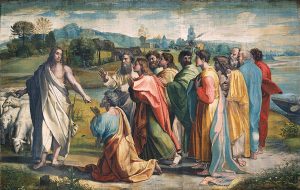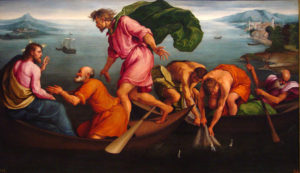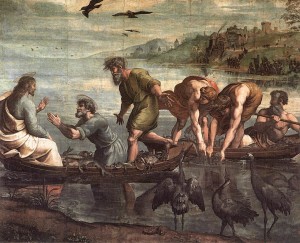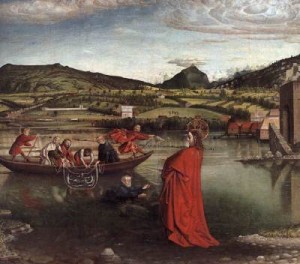Illuminations on the Lectionary readings for May 4, 2025 (Easter 3C)
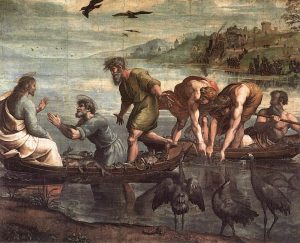
The Miraculous Draught of Fishes (1515), full-size drawing for a fresco by Raffaello Sanzio da Urbino (Raphael, 1483-1520). Victoria and Albert Museum, London. (Click image to enlarge.)
First Reading: Acts 9:1-20
How do we recognize God in our lives? How do we respond when God calls? Consider Saul in Sunday’s first reading. Early Christians had every reason to fear Saul: a frightening figure, a Pharisee angry with the unorthodox new Messianic movement, Saul persecuted the Christians with all his strength. But when Jesus confronted Saul in a blinding vision on the road to Damascus, everything changed. Saul’s vision reveals that, in persecuting those who follow Jesus, Saul was persecuting Jesus himself. Saul’s anger melts away with his restored vision. Saul becomes Paul, who will go on to take Christianity to the world with a convert’s zeal.
Psalm: Psalm 30
Psalm 30 is framed as a hymn of thanksgiving, expressing gratitude to God for the Psalmist’s recovery from a serious illness. Its verses resonate with the experience of Saul in the first reading, who evolved from hatred to life in Christ, and with Peter in the Gospel, who bravely proclaimed Jesus after having denied him three times. In this psalm we sing out in faith that while sadness and anger are short-lived, the joy of God’s favor lives forever. “Weeping may spend the night,” we pray in this familiar verse, “but joy comes in the morning.”
Second Reading: Revelation 5:11-14
In last week’s reading from Revelation, we heard the prophecy that Christ would be “ruler of the kings of the earth.” This week, a few chapters further along, we visualize a scene of triumphant heavenly worship including all creation. All the angels and elders of heaven, all the creatures of heaven and earth, humans and animals from land and sky and sea, all these join in worship and song. Together, they sing a majestic hymn, filled with symbolic language, that reveals an unexpected surprise: Jesus’s kingship is not that of a roaring lion or any earthly ruler, but a lamb, a vulnerable creature, symbol of the Passover. This is a victim who once was slaughtered but now is raised and glorified for all.
Gospel: John 21:1-19
Seven of the disciples are back home in Galilee, perhaps seeking a break from the emotions of Jesus’s crucifixion, resurrection, and mysterious appearances. They take their boat out to go fishing at night, but have no luck. Suddenly, a stranger appears on the shore and suggests that they cast their net on the other side of the boat. As they haul in a huge load, they recognize that the stranger is Jesus. Peter jumps into the water and heads for shore, followed by the delighted crew. Jesus serves them fish and bread from a charcoal fire; then Jesus asks Peter three times, “Do you love me?” Peter, apparently forgetting how recently he had denied Jesus three times, is offended that Jesus has to ask this repeatedly. Then Jesus directs Peter, “Feed my lambs. … Feed my sheep,” and calls him, as he had done at the beginning of his ministry: “Follow me.”

